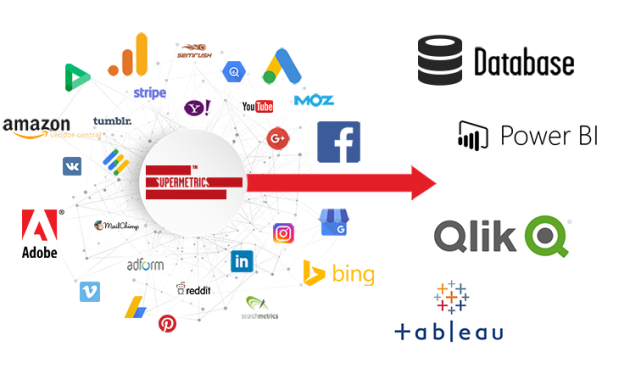
Business Intelligence Software: A Gateway to Data-Driven Decisions
In today’s fast-paced business environment, data reigns supreme. Companies are constantly bombarded with information, but raw data alone is useless. The true power lies in extracting meaningful insights, identifying trends, and making informed decisions. This is where Business Intelligence (BI) software becomes indispensable. It’s not just a technological tool; it’s a strategic asset that empowers businesses to thrive. This article delves into the world of Business Intelligence software, exploring its capabilities and demonstrating how it unlocks opportunities for growth and innovation.
The core function of Business Intelligence software is to transform raw data into actionable intelligence. This involves a multi-step process, including data collection, cleaning, analysis, and visualization. The software integrates data from various sources, such as CRM systems, marketing platforms, financial records, and operational databases. It then processes this data, identifies patterns, and presents the findings in a clear and concise manner, often through dashboards, reports, and interactive visualizations. This allows users to quickly grasp complex information and make data-driven decisions.
Understanding the Core Functions of Business Intelligence Software
Business Intelligence software offers a wide range of functionalities. These functions collectively enable organizations to gain a competitive edge. Key capabilities include:
- Data Integration: Seamlessly connecting to and extracting data from diverse sources. This might be a key feature.
- Data Warehousing: Storing and managing large volumes of structured and unstructured data in a centralized repository.
- Data Mining: Discovering patterns, trends, and anomalies within the data using advanced analytical techniques.
- Reporting and Analysis: Generating customized reports and performing in-depth analysis to understand business performance.
- Data Visualization: Presenting data in a visually appealing and easy-to-understand format, such as charts, graphs, and dashboards.
- Performance Management: Monitoring key performance indicators (KPIs) and tracking progress toward business goals.
The Benefits of Implementing Business Intelligence Software
Investing in Business Intelligence software offers numerous benefits. These benefits extend across various departments and organizational levels. They ultimately contribute to improved decision-making and enhanced business performance. Here are some key advantages:
- Improved Decision-Making: Access to real-time data and insights empowers managers to make more informed decisions. This is crucial.
- Enhanced Efficiency: Automating data analysis and reporting frees up valuable time and resources.
- Increased Revenue: Identifying new market opportunities and optimizing sales strategies can lead to increased revenue.
- Reduced Costs: Optimizing operational processes and identifying inefficiencies can lead to significant cost savings.
- Better Customer Understanding: Analyzing customer data can provide valuable insights into customer behavior and preferences.
- Competitive Advantage: Gaining a deeper understanding of the market and competitors allows businesses to stay ahead.
Real-World Examples: How Business Intelligence Software Drives Success
The impact of Business Intelligence software is evident across various industries. Many organizations have successfully leveraged BI tools to achieve their business objectives. Here are some examples:
- Retail: Retailers use BI to analyze sales data, identify popular products, and optimize inventory levels.
- Healthcare: Healthcare providers utilize BI to track patient outcomes, improve operational efficiency, and identify areas for improvement.
- Finance: Financial institutions leverage BI to detect fraud, manage risk, and improve customer service.
- Manufacturing: Manufacturers employ BI to monitor production processes, optimize supply chains, and improve product quality.
- Marketing: Marketers use BI to analyze campaign performance, understand customer behavior, and optimize marketing spend.
Choosing the Right Business Intelligence Software: Key Considerations
Selecting the right Business Intelligence software is critical to its successful implementation. The ideal solution will depend on your specific business needs and requirements. Consider these factors when evaluating your options:
- Data Sources: Ensure the software can integrate with your existing data sources. This is very important.
- Scalability: The software should be able to handle your current data volume and scale as your business grows.
- Ease of Use: The software should be user-friendly, with an intuitive interface.
- Reporting and Visualization Capabilities: The software should offer a wide range of reporting and visualization options.
- Security: Prioritize software with robust security features to protect your data.
- Cost: Consider the total cost of ownership, including software licensing, implementation, and training.
- Vendor Support: Evaluate the vendor’s reputation and the level of support they provide.
Implementing Business Intelligence Software: A Step-by-Step Guide
Successfully implementing Business Intelligence software requires a structured approach. This ensures a smooth transition and maximizes the value of your investment. Here’s a step-by-step guide:
- Define Your Objectives: Clearly identify your business goals and the specific insights you want to gain from the software.
- Assess Your Data: Evaluate your existing data sources and assess their quality and completeness.
- Choose the Right Software: Select the Business Intelligence software that best meets your needs.
- Plan the Implementation: Develop a detailed implementation plan, including timelines and resource allocation.
- Integrate Your Data: Connect the software to your data sources and configure data extraction and transformation processes.
- Train Your Users: Provide comprehensive training to your users on how to use the software.
- Monitor and Evaluate: Continuously monitor the performance of the software and make adjustments as needed.
The Future of Business Intelligence: Trends and Innovations
The field of Business Intelligence is constantly evolving. Several trends are shaping its future. These innovations are making BI more powerful and accessible. Some key trends include:
- Cloud-Based BI: Cloud-based BI solutions offer greater flexibility and scalability. This is a growing trend.
- Artificial Intelligence (AI) and Machine Learning (ML): AI and ML are being integrated into BI tools. This helps automate analysis and predict future trends.
- Self-Service BI: Self-service BI tools empower business users to analyze data without relying on IT.
- Data Democratization: Making data accessible to everyone within an organization, regardless of their technical expertise.
- Mobile BI: Accessing BI dashboards and reports on mobile devices.
Conclusion: Harnessing the Power of Business Intelligence
Business Intelligence software is no longer a luxury; it’s a necessity for businesses that want to thrive. By transforming raw data into actionable insights, BI empowers organizations to make better decisions, improve efficiency, and gain a competitive advantage. As technology continues to evolve, the opportunities presented by Business Intelligence software will only continue to grow. Embracing BI is essential for any organization seeking data-driven success. The right Business Intelligence software can unlock a world of opportunities.
[See also: Related Article Titles]

